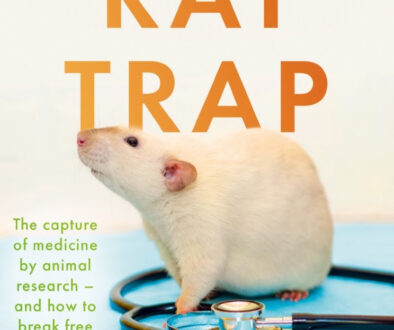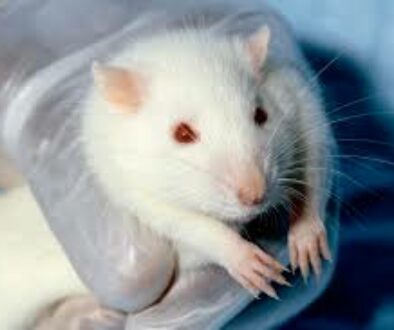Interview with Dr Pandora Pound
Interview with Dr Pandora Pound
Pandora Pound is Research Director for Safer Medicines Trust, a UK based patient safety charity. She has a PhD in the Sociology of Medicine and over two decades’ experience of conducting research in a wide range of fields. In 2004 she was lead author of a landmark paper published in the British Medical Journal which led to a series of systematic reviews that ultimately exposed the scientific limitations of animals in preclinical research. She has written numerous academic papers on the scientific drawbacks of using animals as models for humans. She is a Fellow of the Oxford Centre for Animal Ethics.
Antidote Europe (AE) : We are both delighted and honored to be able to interview you on the occasion of your new book entitled « Rat Trap ». Can you tell our readers what motivated you to write such a book at this particular time ?
Pandora Pound (PP) : Thank you very much for this opportunity to discuss Rat Trap, I really appreciate it. There are several reasons why I felt compelled to write this book now. First, a great deal of evidence has been accumulating in the scientific literature – evidence about the poor science underlying animal research, as well as evidence about its futility – and I felt it was important to get this evidence out of journals and into the hands of the general public. The poor science underlying animal research is an open secret within the scientific world, but many lay people still regard animal research as a ‘necessary evil’ and assume that the science is robust. Unfortunately, as I point out in Rat Trap, this is far from the truth. Second, after decades of animal research, it is now becoming clear that – far from progressing medicine – this research has failed to generate treatments for even our most common diseases, such as stroke, Alzheimer’s and cancers, meaning that patients and families continue to suffer, despite the millions we pay in taxes and charitable donations for animal research.
Happily, however, innovative technologies and inspiring new approaches that do not rely on animals are coming to the forefront and that is the third reason why I wrote this book now. Technologies based on human cells and human biology, together with computer-based (in silico) methods, artificial intelligence and approaches that focus on the very earliest signs of disease are beginning to revolutionise biomedical science, and I wanted to tell people about these.
AE : Could you describe how you first discovered animal experimentation and what events led you to begin to doubt the scientific value of this practice ?
PP : I worked for many years within medical schools and I was always aware that somewhere within the bowels of these institutions there would be an animal research laboratory. It wasn’t until the late 1990s though, when I was working at St Thomas’ Hospital Medical School in London, that the issue became more pressing for me. Here my office was quite close to the animal lab and I very occasionally saw cages on trolleys being wheeled in and out of a service tunnel that ran beneath the medical school and once saw a sheep being unloaded in a yard below my office and taken into the medical school.
I tried to find out more by responding to a call for lay people to join the animal research ethical review board within the medical school, but the chair made it clear that he would not welcome my application. I began to think and read more and more about the issue. I was particularly interested in the justification for animal research – the supposed benefits for humans – and I searched high and low for good quality evidence that animal research generated benefits for humans, but I couldn’t find any. It all seemed to be anecdotal, or cherry picked. Claims were routinely made by respected scientific and medical institutions about its value – that it was responsible for medical breakthroughs, that it was essential for medical progress, and so on – but without any evidence to back them up. A few years later, with some professors of epidemiology, I raised this issue in a paper published in the British Medical Journal, entitled ‘Where is the evidence that animal research benefits humans?’
AE : What in your opinion are the biggest obstacles that stand in the way of replacing the animal model paradigm in regulatory testing ?
PP : Regulatory agencies have been using animal tests for decades and tend to regard them as the ‘go-to’ tests because they’re used to them, and the whole international regulatory system is attuned to them. They’re confident about using animal data as the basis for making their decisions about drug safety and they tend to be unfamiliar with the potential of human biology-based methodologies. But this means regulators are often unable to provide clear guidance to scientists who want to use human-focused methods. Given this lack of guidance, scientists using innovative approaches may worry that their human-based data could be rejected by regulators so they continue to submit animal data, believing it to be the simplest and fastest route to regulatory approval.
To avoid confusion, regulators need to spell out their requirements much more clearly. The FDA Modernisation Act 2022 recently clarified that scientists in the United States are no longer compelled to use animals in the safety testing of medicines, paving the way for innovation. Other regulators need to do similarly. However, not all responsibility for the continued use of animals by drug companies can be laid at the door of regulators. Companies may benefit from regulations that mandate the use of animals in safety testing because, ironically, this gives them legal protection if they are taken to court by individuals who have suffered adverse drug reactions. This is another reason why the regulations need to be urgently reformed; once animal data are no longer considered the gold standard, companies will be unable to protect themselves in this way.
AE : What in your opinion are the biggest obstacles that stand in the way of replacing the animal model paradigm in academic research?
PP : There are lots of obstacles, but a really important factor is the failure of animal research regulation. Regulators in the UK continue to approve and license every single animal study that is submitted to them, despite claiming that animal studies are only approved as a last resort, when there is no other way of conducting the research. Another factor is funding. Animal research that has consistently and reliably failed to produce any benefit for decades – such as that in the field of stroke – continues to be funded. Funders don’t appear to audit the outcomes or impact of their research – they seem to just continually pour public money into failing approaches, while failing to properly fund approaches that are more likely to deliver benefit, such as those based on human biology.
Animal studies are still considered the gold standard by the editors of many scientific journals, making publication more likely if animals are used. Scientists can have long, lucrative careers using animals and universities benefit from the funding that animal research attracts. The use of animals in science is also a massive global business and many people earn their livelihood, directly or indirectly, from animal research. There are also organisations that exist specifically to protect the interests of animal researchers and to perpetuate the use of animals in science. These groups, for example, ‘Animal Research Tomorrow’, promote a view that animal research is indispensable and here to stay. They are aware of the impending transition away from animal research and are doing all they can to maintain the status quo.
AE : What needs to happen now in order to accelerate the transition from animal experimentation to 21st century human-based technologies ?
PP : At Safer Medicines Trust we promote the use of scientifically valid, human biology-based research methods and technologies for developing safe and effective treatments for patients. Together with our partners in the Alliance for Human Relevant Science, we’re calling on the government to take a lead in supporting a transition away from animal research and towards human-focused research and we want a dedicated minister to lead this transition, with appropriate timelines and targets.
In short, a transition from animal to human-focused research needs to focus on radically reforming funding and regulations. We’re calling for a review of the regulations governing the development of pharmaceutical drugs and are asking for the regulations governing animal research to be properly applied. We’re also calling for increased funding of human biology-based approaches. We don’t need new money for this, funders simply need to disincentivise animal research and incentivise human-relevant research by diverting their funding away from outdated animal-based approaches. For a start, funding for animal research in fields such as stroke, where decades of work have been entirely unproductive, should cease immediately. Funding for basic, curiosity-driven research should also be reviewed. This type of research accounts for the largest proportion of animal experiments in the UK (53% in 2022, compared with 21% for regulatory and 24% for applied). It has no direct application to humans and its impact – aside from generating funding, creating PhDs and boosting careers – is unclear. Since universities and scientists follow whatever funding is available, a radical reform of the funding landscape would be very effective.
AE : We are extremely grateful to you for this interview and for all of your scientific publications on this subject, in addition to your wonderful new book. Is there anything else that you would like to include in this interview that was not covered in the above ?
PP : Thank you. I’d just like to reiterate that animal research harms humans as well as animals. It fails to ensure the safety of human medicines and results in huge suffering for patients with diseases that lack effective treatments. After decades of investigating diseases and treatments in animals and then trying to apply the findings to humans we can now safely say that this approach has not worked. It is much more sensible to study humans directly. And we now have so many ways to study humans – ways that are more ethical, more reliable and more scientific.




